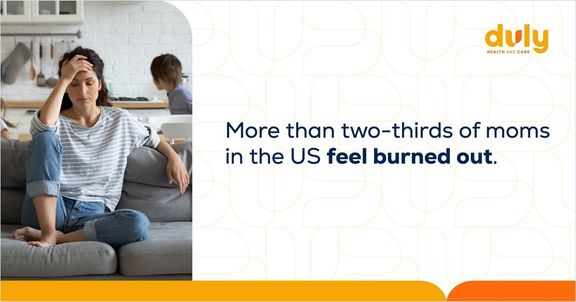Ask a room of moms to raise their hand if motherhood has ever been stressful, and it’s likely that every hand will shoot into the air.
Stress might seem like part of the mom job description. And while some stress is normal and even okay, overwhelming stress can lead to depleted mother syndrome (also called maternal burnout syndrome, or simply mom burnout).
At a Glance: Mom Burnout
- What it is: Ongoing physical, emotional, and mental exhaustion caused by the demands of motherhood.
- Common signs: Fatigue, sleep problems, irritability, guilt, loneliness, or “mom rage.”
- Who it affects: Stay-at-home and working moms alike, with stressors ranging from household duties to work-life balance.
- Why it matters: Unchecked burnout can harm relationships, damage physical health, and increase risk of anxiety or depression.
- Ways to cope: Mindfulness, self-care, realistic parenting expectations, and professional support.
What Is Mom Burnout?
Mom burnout isn’t a medical diagnosis, but it’s a very real problem. It occurs when a mother has symptoms of physical, mental, and emotional exhaustion due to caregiving responsibilities that go beyond her ability to cope. The concept of burnout was originally in the context of work, describing a type of stress people have on the job. In the context of motherhood, burnout looks very similar.
Since mom burnout isn’t a medical condition, there isn’t an official list of symptoms. However, there are characteristics that a lot of moms with burnout share.
Burnout can affect how you feel physically and emotionally, and how you interact with others.
Physical signs
- Low energy
- Fatigue or physical exhaustion
- Sleep problems
- Getting sick more often than usual
- Appetite changes
Emotional signs
- Mental exhaustion and feeling overwhelmed
- Feelings of guilt or shame
- Irritability
- Loneliness
- Thinking that you are a “bad” mom or that being a mom is “too much”
- Feeling that you are different than the parent you used to be or want to be
Behavioral signs
- “Mom rage” (having extreme emotional highs and lows, being hostile, and uncontrollable episodes of intense anger)
- Emotional detachment or social isolation
- Easily snapping at your child or partner, especially for minor things that wouldn’t normally be a big deal
- “Dropping the ball” in other aspects of life, like work or relationships
Also read: Chronic Stress Is Making You Sick

Differences in Burnout Among Stay-at-Home Moms and Moms Who Work Outside the Homes
It doesn’t matter if you’re a stay-at-home mom or you work outside the home. Mom burnout can affect any mother. Women often have a greater mental load (the emotional and cognitive work needed to manage a household like meal planning and scheduling) than men – especially if they are mothers. Recent research shows that moms tackle 71% of the household mental load tasks, while dads take on 45%.
While a lot of burnout symptoms are the same among stay-at-home moms and those who work outside the home, the two groups sometimes experience burnout differently.
Stay-at-home moms often experience mom burnout because of all the caregiving responsibilities they have on a daily basis. They may feel like their partner doesn’t appreciate what they do, or they may be overwhelmed if they don’t have anyone who can share responsibilities. In some cases, they may feel like they are to blame for financial struggles, since they’re not bringing in an income.
Moms who work outside the home might not have the same caregiving responsibilities, but they may be in charge of coordinating their child’s care, which can be very stressful. They might feel exhausted when they come home from a full day of work just to find a whole new set of tasks waiting for them at home, or they might feel guilty about being gone all day and not spending enough time with their child. Even in mid- to high-paying jobs, many moms experience stress from not making enough money to meet their financial needs.
A Word from Our Doctor:
“Being a parent is no easy task. You’re expected to be everything to every one and sometimes it can feel like you’re failing on all fronts. If you feel this way, you aren’t alone. You may have heard of burnout in the workplace, but burnout can happen in relation to parental stress. I’ve struggled with this myself as a parent to a 10 month old, trying to be a great healthcare provider and a great mom. What’s most important is to reach out, find support where you can, and (hardest of all) give yourself some grace. You don’t have to be perfect to be great.”
-Dr. Allison Venzon, MD, Family Medicine Physician at Duly Health and Care, providing full-spectrum care for patients of all ages in Lombard, IL.
Your family needs the best version of you, and that starts with getting the support you deserve. Don’t wait until burnout takes over completely. Schedule an appointment with a psychiatrist, counselor, or therapist today to get the support you need and start feeling like yourself again.
Find a psychiatrist, counselor or therapist near you >
The Consequences of Unmanaged Mom Burnout
The level of stress that comes with burnout can cause significant problems.
Mom burnout can cause you to “take it out” on your child, like yelling or getting very angry over little things. This doesn’t just upset your child – it can also make burnout worse. Once you’ve calmed down, you might think back on it, regret it, and feel shame and guilt. It might even keep you up at night, leaving you exhausted and cranky in the morning. This can create a vicious cycle, where the burnout keeps getting worse.
Additionally, chronic stress (including from mom burnout) can affect your physical health and put you at an increased risk for conditions like heart disease, high blood pressure, irritable bowel syndrome (IBS), and type 2 diabetes.
In severe cases, mom burnout can also take a serious toll on your mental health. The burnout can lead to depression, anxiety, problems with alcohol or substance use, or even thoughts of self-harm or suicide.
How to Treat Mom Burnout
Fortunately, there is no shortage of options when it comes to managing symptoms of mom burnout. Be patient – it might take trying a few different methods or combining them to find what works best for you.
Also read: Tips to Avoid Millennial Burnout
Practice Mindfulness.
Mindfulness is the practice of being fully aware of what’s happening in the moment inside your body and within your surroundings and accepting what’s happening without judgment. It’s been shown to reduce stress, help keep you from feeling overwhelmed, and improve symptoms of depression and anxiety.
Meditation, deep breathing, mindful eating, and exercises like yoga are all great ways to incorporate mindfulness into your everyday life. You may also want to learn about mindful parenting, which is when you focus on the here and now with your children, rather than focusing on what’s to come.
Learn more about practicing mindfulness.
Prioritize Self-Care.
Self-care is critical for maintaining both physical and mental health, so make sure to take time for yourself. Even 15 minutes of alone time can be enough to make a difference in reducing stress.
A key part of self-care is setting boundaries and learning to say “no” to others. It’s okay to turn down plans so you can have a night in or to sit out of volunteering at the school bake sale. If household chores are piling up, and your children or partner are capable of taking some of them on, don’t be afraid to ask them for help.
Set Realistic Parenting Expectations.
There’s no such thing as “perfect” when it comes to parenting. The more you try to achieve perfection, the worse it can feel and the more stress it can cause when it doesn’t happen.
This means letting yourself off the hook that one night you can’t handle cooking and decide that breakfast for dinner night is in order. It also means resisting the urge to compare yourself to other moms and, instead, do what works best for you and your family.
Know When to Get Help.
You don’t need to handle mom burnout alone. Sometimes, practicing self-care or talking with other moms who are going through similar experiences can help you feel less alone and learn coping strategies. But other times, you might benefit more from working with a mental health provider, like a counselor or psychologist. They can help you discover ways to de-stress, improve your mental and physical well-being, and get off that mom burnout train.
Don’t wait until you’re completely depleted to get help. Schedule an appointment with a Duly Health and Care mental health provider today, because you deserve support, not just survival.
To schedule an appointment, please call 815−942−6323.





